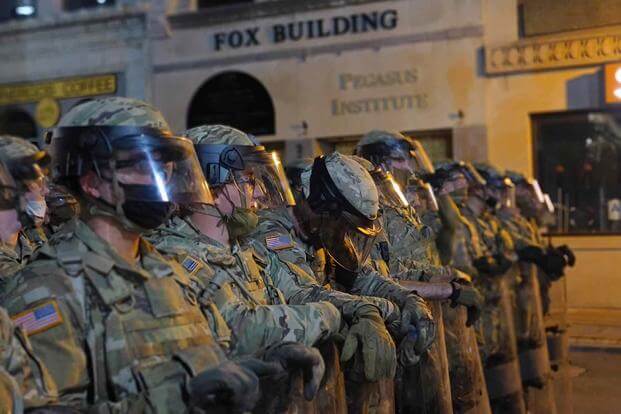Leading veterans organizations are pushing senators to take up legislation to expand GI Bill eligibility for National Guardsmen and reservists before the end of this congressional session, after which their efforts would have to go back to square one.
At issue is the fact that many National Guard deployments don't allow troops to accrue GI Bill benefits, nor does the time Guardsmen and reservists spend on active duty for training -- something advocates for part-time service members say is unjust as those troops are increasingly relied upon for domestic missions, ranging from guarding the southern border to helping with pandemic response.
The House passed a bill in January to fix the disparity. But the Senate has yet to take it up, and any bill that hasn't cleared Congress by the time a new session starts at the beginning of the year has to be reintroduced and repassed.
Read Next: Marine Corps F-35 Damaged After Landing Gear Failure In Okinawa
"Given the shared focus on supporting our National Guard and Reserve service members, we implore you to come to a bipartisan agreement that passes GI Bill parity before the end of the 117th Congress," 15 veterans service organizations, led by the American Legion, wrote in a letter sent Thursday to Senate Veterans Affairs Committee Chairman Jon Tester, D-Mont., and committee ranking member Sen. Jerry Moran, R-Kan. "Our service members have earned it."
To be eligible for at least some GI Bill benefits, a service member has to serve for at least 90 days, not including basic training. To get a full scholarship, the time commitment increases to 36 months. Someone discharged for a service-connected injury is eligible for the full benefit if they served at least 30 days.
For the National Guard, so-called Title 32 orders do not count toward GI Bill benefits accrual unless they are in support of a presidentially declared national emergency. Title 32 orders are considered federal active-duty orders and are paid for by the federal government, but state governors remain in actual command of their National Guard forces.
The time that Army National Guardsmen spent on Title 32 orders or other domestic missions increased more than 1,000% from 2016 to 2021, from 818,496 man-days to 9.5 million man-days, according to data shared by the American Legion.
Some high-profile Title 32 deployments in recent years were for national emergencies, such as the COVID-19 response, and so counted toward GI Bill eligibility. But others, such as the mobilizations during the racial justice protests of summer 2020, were not declared national emergencies and so didn't earn the education benefits.
In their letter, the veterans groups argued that reforming GI Bill eligibility could help with retention issues facing reserve components.
"Ensuring these servicemembers have the same education benefits as their active-duty counterparts is a logical first step towards parity in recruitment and retention," they wrote.
The House-passed bill, called the Guard and Reserve GI Bill Parity Act, would allow any day a Guardsmen or reservist is paid and in uniform on federal orders, including for training, to count toward GI Bill eligibility.
While the full Senate has not taken up the bill, the Senate Veterans Affairs Committee advanced a similar but slightly different bill late last year dubbed the Guard, Reserve and Active-Duty, or GRAD, Department of Veterans Affairs Educational Assistance Parity. The main difference from the House bill is that the GRAD Act would not count monthly weekend drills, nor reservists' annual drills, toward GI Bill eligibility, though some other Guard exercises, such as the annual two-week training, would count.
Republicans, while acknowledging the inequality Guardsmen and reservists face in becoming eligible for the education benefits, mostly opposed the House bill over cost concerns. House Republicans do not want any Guard or reserve training to count toward GI Bill eligibility.
The Congressional Budget Office estimated that the expansion of benefits in the House bill would cost $1.9 billion over the next decade.
With Republicans poised to take control of the House in January, veterans service organizations see the remainder of this congressional session as their best chance to get a bill passed.
But time is already running out. The Senate has just 13 legislative days left in its schedule this year and has several must-pass items on its to-do list, including the annual defense policy bill and a bill to keep the government open when current funding expires Dec. 16. That makes it unlikely senators will take up a GI Bill parity proposal unless it gets attached to one of the larger bills. An American Legion official did not immediately respond to a question on whether the organizations are pushing for it to get on a larger bill.
While the veterans service organizations favor the House bill, they are open to the GRAD Act if it means a bill would pass this session.
"The responsibilities of maintaining an operational Guard and Reserve have led to critical manpower shortfalls that require immediate action," they wrote. "Providing GI Bill parity is an immediate step that the Senate can take to address these shortfalls and acknowledge their service."
-- Rebecca Kheel can be reached at rebecca.kheel@military.com. Follow her on Twitter @reporterkheel.
Related: House Votes to Expand GI Bill Eligibility for National Guard, Reserves













